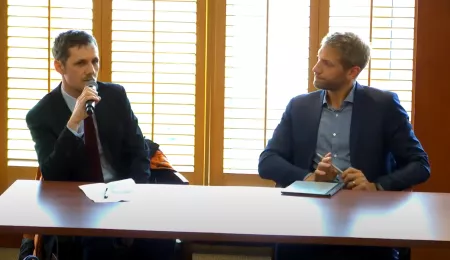
In March, Russia’s invasion of Ukraine upended Arctic diplomacy and prompted the Arctic Council, the leading intergovernmental forum for promoting cooperation in the Arctic, to pause all official meetings until further notice. Yet accelerating Arctic thaw—which is altering, perhaps irrevocably, the fragile ecosystems on which so many of the region’s four million residents depend—demands collaboration with Russia, no matter the political implications.
In a May seminar organized by the Belfer Center’s Arctic Initiative, “Arctic Ocean Governance: Cooperation After Conflict?”, Andrey Todorov and Andreas Østhagen tackled the thorny question of how to proceed with Arctic Ocean governance, turning to historical examples of cooperation in the Barents Sea and Bering Strait to offer possible paths forward. Arctic Initiative Senior Fellow Fran Ulmer moderated the talk.
The Conflict Potential of Ocean Governance Issues
Østhagen, Senior Researcher at the Fridtjof Nansen Institute and a Fulbright Fellow at the Wilson Center and Belfer Center, identified two key potential sources for geopolitical tension and conflict in the Arctic. The first can occur when the Arctic is used as a proxy for conflicts elsewhere in the world. Because of Russia’s geographically dominant position in the Arctic, as well as the Arctic’s strategic importance to the Russian military, there are concerns that non-Arctic disputes could spill over into the Arctic.
Ocean governance issues—that is, issues relating to managing a rapidly changing maritime environment and the resources within that environment—represent another potential source of tension. Certain ongoing disputes, such as the international disagreement over the legal status of the Northwest Passage and Northern Sea Route or shipping and fishery management disputes in the Bering Sea, are occurring in the same geographic areas where there is increased military activity and tension between Russia and NATO. These issues could escalate into more serious conflicts if not addressed.
“These issues are not only about ensuring sustainable management of fish stocks. They also have conflict potential—an escalating, spiraling conflict potential, given the current security context,” Østhagen emphasized. “So you need to find mechanisms to alleviate that pressure if you have an incident at sea…How do you take the tension out of small-scale incidents so that they don’t become outright conflict in the Arctic?”
Cooperation with Russia in the Arctic: Necessary and Possible
According to Todorov, Arctic Initiative Postdoctoral Research Fellow, solving ocean governance issues will require cooperation with Russia, which alone accounts for 53% of the Arctic Ocean coastline. “The Arctic is not a global commons…[but] it is still a region with a lot of shared governance challenges that can only be addressed multilaterally. That doesn’t mean, of course, that the Arctic Seven won’t be able to proceed without Russia. But in my opinion, such cooperation—minus Russia—would have limited efficacy.”
In some cases, the consequences of not cooperating with Russia could be severe. For instance, the cod stock in the Barents Sea, the largest in the world, is extremely important to the Arctic economy and as a food source for Arctic residents. When the cod stock experienced a sharp decline in the 1990s, only careful co-management by Norway and Russia prevented a collapse of the fishery. Similarly, the necessity of cooperation with Russia will only grow as increasing ship traffic raises the risk of maritime accidents and environmental disasters in sensitive marine areas.
Even during times of conflict, there is ample historical precedent for cooperation between Russia and other Arctic states on ocean governance issues. Despite the Russian annexation of Crimea in 2014, Todorov pointed out, Russia and the United States still moved forward on a joint contingency plan for combating oil spills in the Bering and Chukchi Seas, which was signed in 2021. Likewise, in the Barents Sea, Norway and Russia have continued to successfully collaborate at the operational level on fisheries co-management, while maintaining dissenting opinions on issues like the legal status of the waters around Svalbard.
A Pragmatic Path Forward
Though none of the panelists were optimistic that the Arctic Council would resume functioning in the same way it did previously, at least in the near future, they expressed hope that a pragmatic approach to cooperation between Russia and the Arctic Seven could be developed.
Østhagen pointed to his home country of Norway as an example: while Norway is following European Union sanctions on Russia, it has safeguarded cooperation with Russia in certain areas, such as fishery management, search and rescue, and Svalbard. The current Norwegian approach is “not to expand cooperation with Russia,” said Østhagen, but to “stop the dominoes from falling—that is, to stop conditions in the Arctic from deteriorating even further.” To this end, he recommended that Arctic states depoliticize governance structures and nip governance disputes in the bud by taking proactive measures to de-escalate and resolve them before they become major conflicts.
Ulmer acknowledged that the Ukraine crisis has had a “chilling effect” on scientific research in the Arctic, but predicted that there will be “considerable cooperation” between individual scientists “to the extent that it can avoid political entanglements.”
“People would very much like to return to the way things were at the Arctic Council table, but that's not going to happen anytime soon,” said Ulmer. “And yet the Arctic Seven and the Permanent Participants have issues that they feel are sufficiently important and timely to move forward with. I think there will be other ways, both multilateral and bilateral, to make needed progress.”
Watch a recording of the seminar below.
Hanlon, Elizabeth. “Arctic Ocean Governance: Cooperation with Russia After the Invasion of Ukraine.” Belfer Center for Science and International Affairs, Harvard Kennedy School, July 7, 2022
